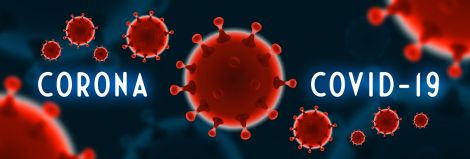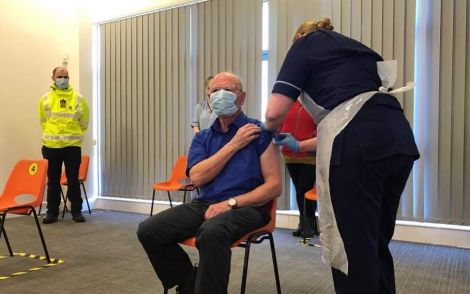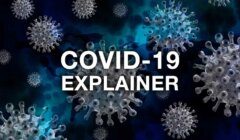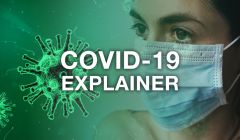Coronavirus / Protecting yourself and others against serious disease
THERE are many reasons to make the effort to get vaccinated against Covid-19, writes our regular expert contributor professor Deborah Briggs as Scotland lifts most level zero Covid-19 restrictions from next Monday.
Probably the most obvious reason to get vaccinated is to protect yourself against serious disease. But it is equally important to be vaccinated in order to protect your loved ones as well as other people that you might come in contact with in your daily life.
I have discussed the effectiveness of Covid vaccines that are licensed for use in the UK in previous articles.
As time passes, increased information and data being collected prove that vaccinated people have a much better chance to avoid being infected with the virus that causes Covid-19 and, if they are infected, data show that fully vaccinated people are less likely to end up in hospital.
What I want to focus on in this article is a few of the reasons why some vaccinated people may still become infected and why sometimes even vaccinated people might pass the virus on to other vaccinated persons.
Our immune systems are complex and consist of several components that work together to fight off diseases, including the disease that we know as Covid-19. Because the virus that causes Covid-19 (SARS-Cov-2) was not circulating in the human population prior to the beginning of the pandemic, our immune systems had never been exposed to this particular virus and never had an opportunity to develop any level of protection against SARS-Cov-2.
We know that each one of us is an individual and genetically different from another person, (with the exception of identical twins that have the exact same genetic makeup). Our genetic differences extend into our individual immune systems as well. Genetic differences can and do account for some of the differences in how an individual is able to fight off a disease like Covid-19. There are still many unknowns about the link between an individual’s genetic makeup and the outcome of a Covid-19 infection.
Become a member of Shetland News
Despite the fact that SARS-Cov-2 was completely unknown to humans and their immune systems prior to the pandemic, Covid vaccines have provided our immune systems with the information that they need to produce antibodies specifically targeted to attack and destroy the SARS-Cov-2 virus.
After two doses of Covid vaccine, most people will have developed high levels of antibodies able to find and destroy SARS-Cov-2 virus if they happen to be exposed to the virus.
However, the antibodies that our immune systems produce do not last forever. All antibodies will naturally die off to low levels, including the antibodies that a vaccinated person will produce after receiving a Covid vaccine. This is a natural process and happens when the specific virus that the antibodies are genetically programmed to fight against is not around anymore and so those specific antibodies are not immediately needed. A low level of antibody will, however, remain present in our bodies.
It is good to know that our immune systems consist of more parts than just antibodies. They also have a type of immune cell known as a ‘memory cell’. This is produced as a result of someone having received a Covid vaccine and will have information stored inside that basically tells it how to produce the type of antibodies that are needed to fight off the SARS-Cov-2 virus that causes Covid-19.
This is the main reason why it is so very important for people to receive a Covid-19 vaccine. That is, people who have received two doses of Covid vaccine will have ‘memory cells’ in their bodies that remember how to produce antibodies specifically targeted to destroy the virus that causes Covid-19 if and when they are exposed.
Once a person is exposed to Covid-19, it does take two to three days for the memory cells of a fully vaccinated person to cause the production of high levels of antibodies against the virus. Thankfully, that process is many times faster in a fully vaccinated person compared to an unvaccinated person.
The reduced amount of time required to produce a high level of antibodies against Covid-19 in a fully vaccinated person is literally often the difference between life and death.
Up until now, two doses of the Covid vaccines licensed for use in the UK are still effective in protecting against disease although emerging data indicates that there is a light reduction in protection against fast spreading variants like the Delta variant, now the predominant SARS-Cov-2 virus variant identified in the UK.
The Delta variant is estimated to be at least 43 – 90 per cent more transmissible than the Alpha or first variant of SARS-Cov-2 virus. As the virus changes over time, the antibodies that our body produces after vaccination might not be quite the perfect fit.
Thus, the antibodies may not destroy the invading virus as efficiently or may take a bit longer to get rid of the invading virus. However, it is critically important to remember that Covid vaccines are still highly effective and will prevent more serious forms of the disease as have a higher chance of happening in unvaccinated individuals.
The final point to consider is the amount of virus that a particular variant of SARS-Cov-2 is able to produce when it first enters a person’s body.
For example, if a fully vaccinated individual is infected with a SARS-Cov-2 virus variant that is able to reproduce itself extremely quickly, (for example the Delta variant), there is a possibility that the Delta variant could reproduce itself so quickly that it could be passed on to another person before the first person’s immune system is able to produce enough antibody to fully destroy the virus and thus prevent further infection.
In fact, the vaccinated individual might not become very ill but would have passed the virus on unknowingly. This possibility is one of the reasons why most medical experts are recommending the continued use of masks indoors even in fully vaccinated individuals.
Professor Deborah Briggs has served as an expert to the World Health Organisation in the field of rabies prevention. She has provided expertise in the field of vaccine production and clinical trials for major pharmaceutical companies and continues to teach an online graduate level course in Global Public Health for Kansas State University. She lives in Bridge End, Burra.
More from Professor Briggs:
Pfizer and Moderna Covid-19 vaccines – the first of its kind
Become a member of Shetland News
Shetland News is asking its readers to consider paying for membership to get additional perks:
- Removal of third-party ads;
- Bookmark posts to read later;
- Exclusive curated weekly newsletter;
- Hide membership messages;
- Comments open for discussion.
If you appreciate what we do and feel strongly about impartial local journalism, then please become a member of Shetland News by either making a single payment, or setting up a monthly, quarterly or yearly subscription.

































































